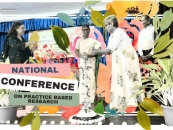-853X543.jpg)
Women profit from urban waste in Vietnam
by Shruthi Venkatesh January 2 2019, 4:53 pm Estimated Reading Time: 2 mins, 5 secsA well-preserved Southeast Asian trading port city of Hoi An in Vietnam has become a significant tourist destination with around 21 million visitors in 2016. The city comprises of nearly 120,000 residents. The day to day tourist visitors are producing around 75 tonnes of solid waste every single day. As a result, the city’s land and streams were increasingly littered, threatening the environment and the health of communities. If not properly contained, eventually the city’s waste will find its way to the oceans - creating global environmental ramifications.
8.jpg)
Women profiting from urban waste in Vietnam (UN news)
To address this issue, with the support of the GEF Small Grants Programme (SGP), Hoi An’s Women’s Union created a long-term waste management plan that fosters the sustainable development of the city while preserving its cultural heritage. The project not only successfully established a scheme for collecting, sorting, and disposing of waste in Hoi An, but it gave work to a group of poor women, strengthening the social fabric of the community. Since 1998, the Small Grants Program has supported more than 150 projects in Vietnam. SGP supports communities to demonstrate, deploy, and transfer innovative tools and approaches for managing harmful chemicals and waste.
Here, women in Vietnam are turning the solid waste into a profit. Plastic and metals are collected and sold to recycling facilities while biodegradable matter is composted and then passed on to local farmers. The authorities dispose off any waste which can’t be recycled. Ms. Nguyen Thi Lien, a waste picker, previously found herself unable to get a job, as her ability to do agricultural labour intensive work deteriorated with age. This waste management scheme in Hoi An enabled her to find an employment. She says “My life has changed for the better. Us women are very happy and work hard together. We like our jobs very much”.
The project continues to deliver benefits to the women, men, children, and visitors to the city, whilst protecting our global environment. Now, the waste is sorted into three categories: recyclable, biodegradable, and persistent, and disposed of properly.
Biodegradable waste is composted at the household level and then used by local farmers for sustainable agriculture. Plastic, metal, and other recyclable waste is collected and sold to recycling facilities, while persistent waste is collected and disposed of by the local government.
SGP is further linking local experiences on chemicals and wastes and contributing to the global policy dialogue, thereby leading to larger policy impacts.





-173X130.jpg)
-173X130.jpg)


-173X130.jpg)
-173X130.jpg)
-173X130.jpg)